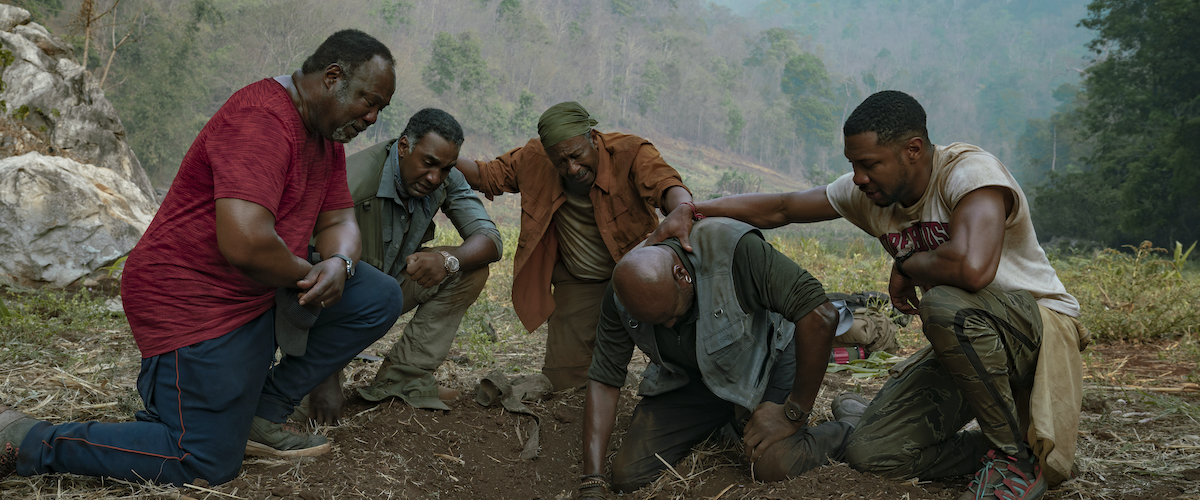
Directed by: Spike Lee
Starring: Delroy Lindo, Chadwick Boseman, Jean Reno, Jonathan Majors, Paul Walter Hauser, Isiah Whitlock, Jr., Clarke Peters, Melanie Thierry, Norm Lewis
Nearly 33 percent of American soldiers in Vietnam were black; fighting for a country that had not even established full equal rights for them. This is not lost on the soldiers, either then or now, and with race relations again at the forefront of American consciousness, Da 5 Bloods is timely and relevant. It is uneven in the first half as it tries to shoehorn a treasure hunt subplot into a more thoughtful story of four black Vietnam vets who return to Vietnam to search for the remains of their fallen comrade and a shitload of gold. But once it gains its footing, Spike Lee's Da 5 Bloods has some powerful things to say about the black soldiers' relationship to Vietnam.
We meet Da 5 Bloods, (the nickname coined by the unit itself) in present day Vietnam, which with McDonald's, stores, bars, and neon lights punctuating the streets looks like any other modern day city. The group consists of Paul (Lindo), who is filled with rage and unresolved issues about his time in the war, Otis (Peters), who learns he fathered a child with a Vietnamese sex worker years ago, Eddie (Lewis), a seemingly wealthy man nowadays, and Melvin (Whitlock), who is more the cutup of the group. Their beloved squad leader Norman (Boseman) was killed in a gun battle years ago, but not before he and the group discovered a downed CIA plane containing a chest of gold bars worth millions today. In anticipation of their re-discovery of the gold, the men consult a shady banker (Reno), who for a commission will transfer the gold to cash which with they can safely leave the country. This doesn't go as planned, and neither does anything else as the men wade deeper into the Vietnamese jungle more than fifty years after last leaving there.
Lee cuts in grainy flashback footage of Norman and the squad's trials in Vietnam. Norman is the voice of reason, and a sturdy leader whom the men look up to. When Martin Luther King is assassinated, it is Norman who calms the others down enough so they don't run off half-cocked looking for a battle as an outlet for their anger. What's unique about the flashbacks is that nothing is done to de-age the men a la The Irishman. They look as they do today, which is effective in terms of continuity and perspective.
Naturally, word of the lost gold gets out, and Da 5 Bloods are hunted by mercenaries who want the gold for themselves. These scenes are capped off by violence which almost feels more at home in a Chuck Norris Missing in Action or Rambo movie (which the guys skewer as unrealistic white guy attempts to right a wrong which was Vietnam). Once the fate of the gold is established, Da 5 Bloods sets its sights on the men making peace at long last with their experiences in Vietnam, especially Paul, whose anger and nightmares are fueled by a sad chain of events long ago. Lindo's performance is the best in the film. His character is given the most depth, and Lindo makes the most of it in perhaps his career-best role in a career filled with memorable character turns. I also enjoyed Boseman's quiet power.
Lee also spices in footage of Muhammad Ali and Martin Luther King, both of whom opposed the war for different reasons. Ali saw no reason to fight in a war against Vietnamese people he had no quarrel with (which led to his famous exile from boxing and a Supreme Court case), while King opposed any show of violence, especially one in which others will die thousands of miles away. We see a snippet of a King speech dated April 4, 1967 in which he spoke out against the war, exactly one year before his death. This puts the speech into chilling context, as does Lee's shot at Trump, calling him President Fake Bone Spurs, underlying the outrage over Trump exerting his privilege while many others did not have such a luxury.
What becomes of the men and the gold? I won't dare say, except that the men exhibit altruism by not merely enriching themselves, but communities and causes which could use the money more than men in their 70's. Paul's son David (Majors), who goes along for the journey in order to reconnect with his father who has cast him aside for unknown reasons, also benefits by finally learning the truth about his dad, how much he was right about him, and how he was also wrong. Is Lee's project a bit far-reaching and trying to cover too much ground? Perhaps, but Lee has never been a filmmaker afraid of pushing boundaries and saying what needs to be said in heartfelt, angry, and ultimately hopeful ways. Lee shows us how we all messed up in the past in hopes of moving towards a brighter and more unified future.
No comments:
Post a Comment